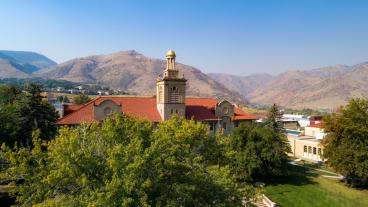Senator Hickenlooper announces bipartisan legislation at the Mines Critical Minerals Symposium

Golden, CO — Sen. John Hickenlooper (D-CO) delivered a keynote address on the important role of critical minerals to the environment, economy and national security on Friday, Sept. 13, at the Payne Institute for Public Policy’s Critical Minerals Symposium. During his speech, Hickenlooper announced a pair of bipartisan bills to guide a national strategy on a clean, responsible and innovative approach to sourcing critical minerals.
“We need to secure energy independence for America. We can’t do that, and we can’t ethically address climate change, without taking the lead on critical minerals,” Hickenlooper said. “Critical minerals, as they’re mined today, can cause great harm to the very Earth we’re talking about saving. And whether or not we solve that paradox is going to make the difference between solving climate change or succumbing to it.”
To address this challenge, Hickenlooper and Senator Thom Tillis (R-NC), introduced the bipartisan Unearth Innovation Act. The bill would establish a Mining and Mineral Innovation Program within the Department of Energy, focused on research, development and commercialization of advanced mining, recycling and processing technologies. The program would prioritize innovations that reduce environmental and human impacts, improve community outcomes and reclaim existing mine and waste sites.
The legislation also encourages partnerships with academic institutions, like Colorado School of Mines, whose world-leading education and research in mining and minerals integrates environmental stewardship, innovation and social impact with advanced technologies and sustainable practices to boost productivity, improve safety and minimize environmental harm.
“A sustainable and reliable critical mineral supply chain will require low-carbon, low-impact mining operations that prioritize community and environmental values,” said Walter G. Copan, Vice President for Research and Technology Transfer at Colorado School of Mines. “As a global leader in mining and mineral engineering and research, Mines commends senators Hickenlooper and Tillis for advancing next-generation mining technologies that support America’s economic, energy and national security future.”
In addition, Hickenlooper announced the introduction of the bipartisan National Critical Minerals Council Act, which would establish a National Critical Minerals Council to develop and implement a national critical mineral strategy and coordinate federal investments and research. The bill would appoint the vice president as the chair of the council and establish a chief minerals advisor, appointed by the president, to oversee the operations.
The Senator’s keynote address was part of the Payne Institute for Public Policy’s second annual Critical Minerals Symposium, which brought together global leaders from government, business, academia and the community to discuss the future of critical minerals. The event highlighted Mines' expertise across the full life cycle of critical minerals, including mining and mineral economics, policy and community engagement, and served as a platform for solutions-oriented discussions on the opportunities and challenges in the critical minerals sector. Topics addressed by global experts included geopolitics, the mine of the future, the minerals workforce, supply chain transparency, permitting, community engagement and investments and markets.
Mines, a public R1 research university specializing in engineering and applied science, is globally recognized for its expertise across the entire mining and mineral lifecycle—from exploration to reclamation, as well as in areas like community engagement, economics and public policy. According to the 2024 QS World University rankings, Mines is home to the No. 1 mineral and mining engineering program in the world and the only mineral and energy economics program in the United States.




